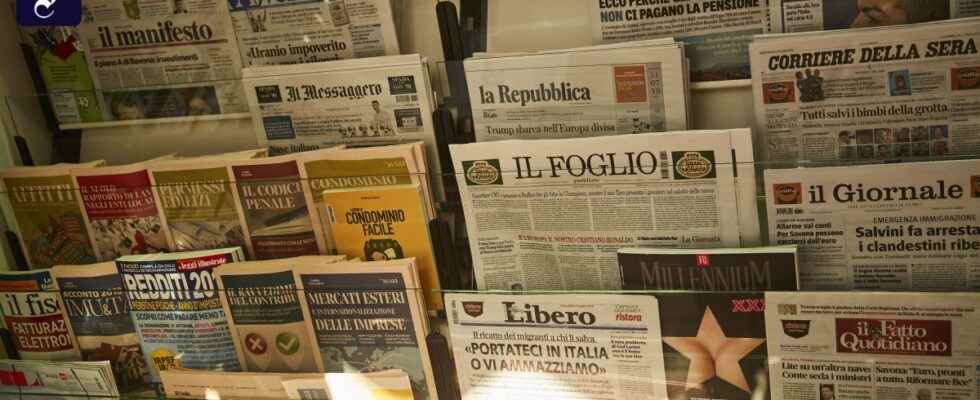Angelo’s newspaper kiosk is on Via Francesco Melzi d’Eril, and anyone in the neighborhood who prefers a paper newspaper to a tablet or smartphone buys it there. There hasn’t been another one for years, and three kiosks in Italy are dying every day due to falling sales. Angelo, around sixty, wiry, gray curls, large silver rings on his fingers, who, if Milan were on the sea, would certainly have opened a boat rental company or a beach bar as a young man, but fortunately would never have thought of converting his kiosk into a lucrative Mini -To have the supermarket transformed, as is now often happening in Milan.
His kiosk is still like an Italian “edicola” should be: There are newspapers like the “Corriere della sera”, like “Il Manifesto”, “La Stampa”, and of course the pink “La Gazetta dello Sport” as well Gossip newspapers and fashion magazines, and there’s glitter putty or whoopee cushions for children. Angelo knows almost every one of his customers by their first names, he addresses older people as “Professoressa” or “Professore”; he knows exactly what time they usually go to his kiosk; on the way to work, walking, jogging; he has treats for her dogs and the newspaper of her choice for herself. The exchange of money and goods only takes seconds, a greeting, that’s it, and sometimes it seems as if the kiosk is not a kiosk but a contact point for energy food on a marathon route.
An oracle during the pandemic
You can also chat with Angelo. Weather, love, family, neighbors, politics – Angelo knows the gossip in the neighborhood, has experienced umpteen governments, including the headlines about the election and deselection, of course. Especially at the height of the pandemic, everyone wanted to talk to him. Buying a newspaper was one of the few reasons I was allowed to leave the house. People queued up in front of the kiosk, in the depths of which Angelo was enthroned like an oracle and had the right words ready for everyone – the lonely, the anxious, the angry.

A typical Italian kiosk, this one is in Foggia
:
Image: Ricardo Wiesinger
At that time, he was only seen with a respirator. It was only in late summer of this year, when Italy’s mask requirement was greatly relaxed, that Angelo’s nose and mouth could be seen again. Suddenly his teeth, or rather what’s left of them, were visible. The loosening teeth drama had certainly started years ago and has intensified during the pandemic. This fact literally jumped out at you when Angelo was talking and laughing, accompanied by fine droplets of saliva. Without a closed tooth barrier, they have a free path.
Difficult everyday life as a single father
Of course, many customers shied away from that mouth, suddenly preferring to stay short rather than long, and you don’t have to have studied psychology to imagine how that affected Angelo. He withdrew. Quit cutting his hair, shaving. The smeared lenses remained smeared. It was as if he was giving up, he would never be able to pay for the complete replacement of his teeth anyway.
With the little that Angelo earns, he organizes his everyday life as a single father. He leaves the house around 5 a.m., then a nanny comes, makes breakfast, wakes up his ten-year-old son Francesco and takes him to school. Just before 2 p.m. Angelo closes his kiosk, does the housework and is there for Francesco. Saving money is completely impossible in this situation, especially not in the amount of 20,000 euros that Angelo’s denture replacement is said to cost.
A customer named Angela (that’s her real name) was no longer able to watch Angelo’s descent. Under the motto “Let’s give our kiosk seller his smile back!” she started a fundraiser; with small posters with a picture where Angelo is smiling – and therefore resembles the crazy character from a horror film. At first he took the posters down out of shame. Angela persisted. And the district had apparently just been waiting to do something good for its newspaper vendor.
A customer donates 500 euros
From now on, every customer regularly threw something into the large glass that Angela had placed between the newspapers as a donation box. The change. A few coins. A shine. A man who buys Angelo’s newspaper every day, but never says anything apart from saying hello, donated 500 euros. And almost everyone at one point had a story to tell about dental problems, experiences with dentists, or one about being ashamed of physical imperfections. This all happened in September. Now, three months later, the jar is still there.
Angela empties it regularly, she also writes down the new status. These days it says: 6548 euros. Italy is also groaning under high energy prices, are donations still being made? Angelo says, “Yes, but I still have a way to go.” He smiles, showing two beautiful rows of teeth; it is the provisional solution, made possible by the first round of donations. Angelo was also at the hairdresser’s. He is always shaved now. He has new glasses. And in maybe a year or two, he’ll be the first newspaper vendor in Italy to have teeth given to him by the neighborhood’s newspaper readers.
